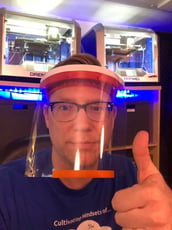We know the critical need to empower students to thrive in our evolving world, but that need has come front and center as our country responds to COVID-19. PLTW Teachers and students are rapidly transitioning to distance learning environments, and while many are grappling with the impacts of working remotely, this new normal hasn’t stopped our PLTW network from seeing needs in the community and using knowledge and skills to address them. Now more than ever, thank you to our PLTW family for using your communication, collaboration, critical- and creative-thinking, and problem-solving skills to lead the way through this evolving situation.
“I’m learning along with them as we transition to this,” said Tracy Swedlund, PLTW Teacher at Medford Area Senior High School in Wisconsin, as he shared his experience pivoting his entire classroom experience to be delivered online amidst the evolving COVID-19 situation. “I look at this, and I know I’m not the tour guide anymore. I’m the river raft guide, and I’m on this ride with my students trying to get us all from A to B.”
When Swedlund, a PLTW Master Teacher for Environmental Sustainability (ES) and PLTW Engineering Design and Development (EDD), started shifting to PLTW distance learning, he already had teams of students working together on projects to be presented at an end-of-year competition. Now, he says, along with developing the content knowledge, those students are learning a whole new level of transferable skills, such as the ability to communicate, collaborate, and solve problems virtually.
“I had students working collaboratively all year, but now they are learning to be flexible with each other,” he said. “I can’t say enough about their effort. They’re plugging away and figuring out the logistics.”
Part of those logistics is feeling comfortable using video conference tools to collaborate with classmates, which is a hurdle Swedlund remembers overcoming himself.
“When I had to do my first video conference, I was nervous, because it’s the first time showing yourself on camera and all that, and it’s the same with students,” he said. “It’s a skill they’ll use for the rest of their lives. You might have a call with ten other colleagues or with customers, and you have to learn how to present yourself professionally, not speak over each other, and how to collaborate. They’re also learning time management and trusting that your teammates are doing work even when you’re not meeting.”
Swedlund’s attitude is positive as he continues to see how remote working and learning impacts his colleagues and students.
“No one signed up to do this, but we’ve learned how to transition,” he said. “I think in the end, there’s going to be a lot of good that comes out of this. We’re going to see new things we didn’t know could happen. Some people can get frustrated, but you can dwell on the problem, or you can find a solution.”
That’s why Swedlund now calls his lessons DLOs or “distance learning opportunities.”
“One thing that has been positive is I’ve had more contact with PLTW teachers, even outside my own discipline,” he said. “I’ve started recognizing faces from Community pages [on myPLTW]. It’s a bigger network now, and I’m able to connect with more people. We’re learning we can meet more and put faces with names. I’m part of a community, and I’m humbled because there’s so much knowledge that comes from everyone.”
Just as Swedlund teaches his PLTW students to use their knowledge and skills, and a bit of time-management, to solve real-world problems, he is leading by example as he 3D prints personal protective equipment (PPE) for healthcare providers in his community.
“Between my virtual meetings with my students, I’ve been using my spare time to use open source files to print face masks and face shields for my local medical professionals.”
So far, he has printed more than 70 face shields, more than 20 face masks, and more than 400 ear savers for essential workers at hospitals, grocery stores, nursing homes, and even dental clinics. He says what’s really special is it allows his students to see teachers in a different light.
“We’re going to do what we can do for our community,” he said. “It’s nice to see a bunch of PLTW Teachers getting excited, and the students see that.”


